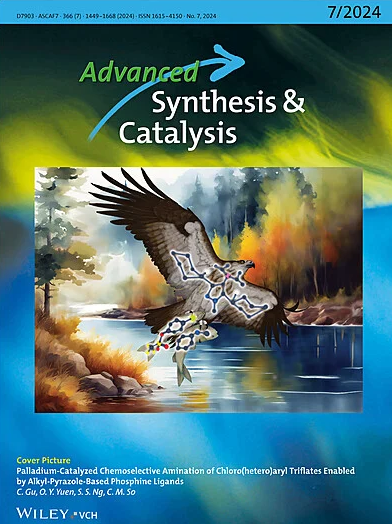过渡金属催化烯烃硫代和磺化反应的研究进展
IF 4
2区 化学
Q2 CHEMISTRY, APPLIED
引用次数: 0
摘要
由于这种键在生物活性分子、药物、农用化学品和功能材料中广泛存在,构建C - 5s键的高效和选择性策略的发展在有机化学和药物化学中引起了极大的关注。在各种方法中,烯烃硫代化和磺化是有机硫合成最直接的方法之一,可以将含硫官能团直接引入不饱和烃中。本文综述了过渡金属催化烯烃硫代化和磺化形成C - 5s键的最新进展(2013年至今)。我们系统地讨论了合成方法,包括过渡金属催化的氢硫基化、碳硫基化、氢磺化和碳磺化,强调了它们各自的底物范围、化学选择性、区域选择性、对映体选择性和反应机理。通过整合最新的发展和批判性观点,本综述旨在为研究人员提供宝贵的资源,鼓励在这一充满活力的领域进一步探索和创新。过渡金属催化C - 5s键形成的持续发展有望为药物发现、材料科学和合成方法带来新的机遇。本文章由计算机程序翻译,如有差异,请以英文原文为准。
Recent Advances in Transition‐Metal‐Catalyzed Thiolation and Sulfonylation of Alkenes
The development of efficient and selective strategies for constructing CS bonds has garnered significant attention in organic and medicinal chemistry, owing to the widespread presence of this linkage in biologically active molecules, pharmaceuticals, agrochemicals, and functional materials. Among the various approaches, alkene thiolation and sulfonylation stand out as one of the most straightforward methods for organosulfur synthesis, enabling the direct introduction of sulfur‐containing functionalities into unsaturated hydrocarbons. This review provides a comprehensive summary of recent advances (2013–present) in transition‐metal‐catalyzed CS bond formation via alkene thiolation and sulfonylation. We systematically discuss the synthetic methodologies, including transition‐metal‐catalyzed hydrothiolation, carbothiolation, hydrosulfonylation, and carbosulfonylation, highlighting their respective substrate scope, chemoselectivity, regioselectivity, enantioselectivity, and reaction mechanisms. By consolidating the latest developments and critical perspectives, this review aims to serve as a valuable resource for researchers, encouraging further exploration and innovation in this dynamic field. The continued evolution of transition‐metal‐catalyzed CS bond formation is expected to unlock new opportunities in drug discovery, materials science, and synthetic methodology.
求助全文
通过发布文献求助,成功后即可免费获取论文全文。
去求助
来源期刊

Advanced Synthesis & Catalysis
化学-应用化学
CiteScore
9.40
自引率
7.40%
发文量
447
审稿时长
1.8 months
期刊介绍:
Advanced Synthesis & Catalysis (ASC) is the leading primary journal in organic, organometallic, and applied chemistry.
The high impact of ASC can be attributed to the unique focus of the journal, which publishes exciting new results from academic and industrial labs on efficient, practical, and environmentally friendly organic synthesis. While homogeneous, heterogeneous, organic, and enzyme catalysis are key technologies to achieve green synthesis, significant contributions to the same goal by synthesis design, reaction techniques, flow chemistry, and continuous processing, multiphase catalysis, green solvents, catalyst immobilization, and recycling, separation science, and process development are also featured in ASC. The Aims and Scope can be found in the Notice to Authors or on the first page of the table of contents in every issue.
 求助内容:
求助内容: 应助结果提醒方式:
应助结果提醒方式:


